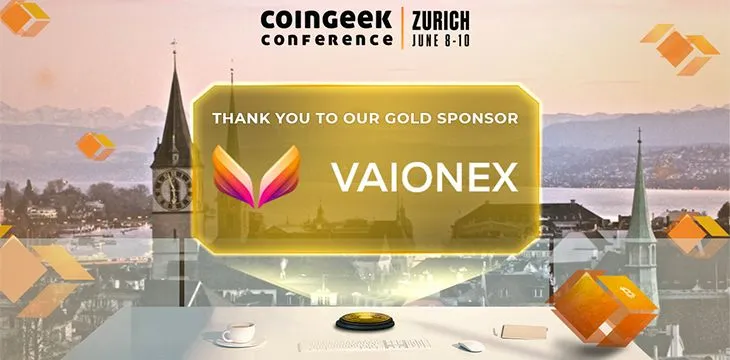|
Getting your Trinity Audio player ready...
|
Founded by students representing Cambridge University’s Metanet Society, blockchain startup Vaionex is aimed at making it easier for anyone to leverage data science and blockchain technologies. CoinGeek recently caught up with its founder and CEO, Robin Kohze, who talked about what’s in the pipeline for Vaionex and why they are sponsoring the CoinGeek Conference in Zurich.
Can you give us a brief overview of what Vaionex does, as well as the problem it aims to solve and service it looks to provide?
Robin Kohze: I’m founder and CEO of the Vaionex Corporation. I’m a Ph.D. student at the University of Cambridge and President of the Metanet Society. I created Vaionex a year ago to provide core infrastructure solutions to the BSV ecosystem and build out a wide variety of platforms that go from user facing, front-end applications towards core infrastructure systems that many applications can use. Currently, we are developing our system towards the support of token solutions, NFT solutions and identity solutions, and we’re soon releasing those. And I think that’s where we see the biggest leap in our company’s history.
What does Vaionex do? Can you explain some of the platforms that you guys have created and what they do?
Robin Kohze: We at Vaionex created a wide variety of platforms such as MetaShard which is the blockchain request database. We created SatoLearn, an interactive learning platform; BSV Developers, a general directory of all the platforms in the space. We created wallet platforms and NFT exchanges that are soon to be released, and all together span a wide ecosystem for both developers and users across the BSV ecosystem.
Recently, Vaionex partnered with CENTI. Can you tell us a bit what you’re doing in collaboration with them?
Robin Kohze: CENTI reached out to us to find technological synergies between the two companies. We have a strong technology background, they have a strong regulatory background and also connections to the merchant space as well as with payment terminals space. Therefore it was an ideal synergy to say let’s together to create one CENTI wallet that has state-of-the-art technology as well as making sure its integrated into the real-world ecosystem.
Vaionex works with STAS token. Can you speak a little bit about STAS tokens, maybe what you guys are doing with them and just a general overview of maybe what we can expect to see built on the STAS protocol?
Robin Kohze: The STAS protocol is quite a novelty in the space. It’s the first protocol that actually is fully on chain, that means that every token in the STAS protocol is handled by a Bitcoin SV smart contract, and that means you don’t require any third parties anymore. The initial building is slightly more complex to handle everything from within the Bitcoin smart contract language, the result is that you have tokens that are completely fungible, not third-party dependent, and very extendable with other Bitcoin scripts. I think that’s a vast technological advantage that wasn’t quite recognized yet and we are the first ones going all in for that token protocol and offering those solutions now both as token solutions but also NFT solutions across the ecosystem.
Robin, why do you find token solutions exciting?
Robin Kohze: It’s mostly because we in the Bitcoin ecosystem are building everything around micro transactions, but the smallest transaction might not even have a monetary value but it’s just an informational transaction—transaction of a license, of a ticket to an access point… All those micro transactions add data to the chain in an immutable way that can then later be reviewed and verified, and I think the smallest transaction one can make is actually a token transaction. That includes intellectual property.
At the moment, we see a lot of payments taking place on the BSV Blockchain. What are your thoughts on moving toward a future where more than monetary value is transacted on chain? What do you think that future looks like?
Robin Kohze: Transferring money is just one way of transferring value. If we talk about personal interactions, family interactions, it’s mostly not that we are sending money around, but we are sending something around that we put effort into creating… and giving that to that person. I think it’s the same with what we see in the physical world where you can give someone money or you can give someone something they really wanted. There’s a significant difference between the two, and that ultimately makes this whole protocol layer so much more exciting. We say we are not just building an accounting system, but we are building a whole new experience that the world can now access.
Is there any sort of estimate of when we’ll see some of these transactions we just spoke about become maybe a bigger part or more frequently used on the Bitcoin blockchain?
Robin Kohze: I think this new wave of transactions and actions that are not just of monetary nature, it’s already happening and started with the NFT solutions where artists could provide the art and make it an immutable token that one could collect as a collectible. But that is just one form of intellectual property; it can be music, it can be videos, and it can be ideas, and I think it already started happening. And from our side, we will now release it in the next month to release token solutions and innovative solutions that in another way interact with users, also in the way that we might not even need BSV as token and satoshis, we can actually use a Bitcoin system to transfer fiat tokens, and that opens the Bitcoin ecosystem to the whole world.
How did Vaionex grow from a small startup with just a couple of people to now a team that’s approaching about 20 people?
Robin Kohze: It’s of course challenging to first find your founding team and then expand on it, then you have regular developers on the team, but it was mostly a first principal thing that we looked at. What do we really need to complete certain products? And then we hired those talent. And then after our successes expanding the team, we sought venture capital from investors. We are still continuing to gather an international team that is highly specialized in their respective fields that provide state of the art solutions as a company for the ecosystem.
When it comes to acquiring talent for Bitcoin companies, it can be difficult because not everybody has that expertise and BSV is relatively new. So when it came to hiring for Vaionex and growing the team, what were you looking for in potential and prospective Vaionex team members or what made somebody a good candidate to join the Vaionex team?
Robin Kohze: The first thing we did at Vaionex was built a learning platform to bring outside developers into the ecosystem so that we could hire top talent and not just from a limited pool of blockchain development. What we then did was since we build the infrastructure, we started to look at what kind of developers real-world solutions needed, not just blockchain solutions. That’s why we are hiring now the top talent from around the world, specifically not from the blockchain ecosystem. But those that have previous experience with building real solutions.
What can Vaionex offer to third party companies, or anyone looking or that is interested in Vaionex services?
Robin Kohze: We, at Vaionex, are creating solutions that simplify all the complexity away from wallet creations, talking solutions, UTXO handling, and we make sure that our partners can directly start developing value and not spend months developing the base infrastructure. What we do then is we often make offers to build whole applications within weeks as the timeframes because we are extremely experienced in doing that now, and then maintain that infrastructure permanently as part of our core infrastructure.
Is there anything going on in Bitcoin right now that has you excited, or are there any developments in particular that you and the Vaionex team are keeping your eye on, focused on or interested in building out?
Robin Kohze: We, at Vaionex, are mostly interested and building out the core infrastructure for the whole ecosystem that includes wallets towards exchanges, regulatory compliant identity systems and significant partnerships with third party companies. What we are very excited about is the amount of people coming from outside the Bitcoin SV ecosystem asking for solutions, and us, with a scalable protocol, being able to provide solutions.
Switzerland is one of the most progressive countries when it comes to blockchain and digital currency. What are you looking forward to the most about the conference being in Switzerland?
Robin Kohze: Having a conference on Zurich is a significant advantage, and so far, that we will now come to the space where the rapid development of the blockchain development and regulatory compliance integration happens. So we are not hiding away from going to other parts of the world. We are directly coming to the heart of blockchain development and regulations. And we do that to show the world, and especially the crypto world, what other solutions can be provided to solve the most significant limitations that we currently have in the Bitcoin ecosystem, which is mostly around scalability. And we saw that it’s not just a niche application to scale blocks, but it’s actually a solution that that can be scaled to the whole world.
Why did Vaionex decide to sponsor CoinGeek Zurich?
Robin Kohze: Now that Vaionex has matured to a more professional company with extra revenue, we decided to also amplify our public relations outreach to come closer to those who are interested in finding builders and not just build it for ourselves and announce on Twitter. So we see it as a significant opportunity to reach out to the BSV ecosystem and show our solutions and also show the wider world what the BSV ecosystem has to offer these days.
What would you say is the core value of the conference for businesses and individuals and the Bitcoin ecosystem, and even outside the Bitcoin ecosystem?
Robin Kohze: As for every conference and any technology space, they are always central hubs of interactions, of discussions and innovation and those yes, it was the CoinGeek conference that was mostly spearheading the innovation in the space, announcing our new projects we saw in the space, but also creating the biggest collaborations in the space, therefore CoinGeek is certainly a significant factor in the growth and progress of the BSV ecosystem.
At the CoinGeek Zurich conference, are there any speakers or presentations that you consider a must see or that you are looking forward to?
Robin Kohze: I’m extremely excited to see TAAL and nChain as industry leaders of the blockchain ecosystem, and see the scaling solutions. But I’m also excited to see our partner CENTI presenting the new wallet application.
If there is one sort of general takeaway that you would want the audience to know after seeing you in the Vaionex team at CoinGeek Zurich, what would it be?
Robin Kohze: That we are a quickly growing company that face very difficult challenges and building very complex platforms as visible in our Vaionex ecosystem, and we are continuing on that path now with new STAS layer 0 token solutions, NFT solutions and identity solutions, and combined into one big wallet solution making us a technology leader in the space. Of course, we are just one of many players who are striving to get that competitive advantage, but for us it’s all about showing what we have and letting the user make those decisions.
Catch Robin Kohze at CoinGeek Conference in Zurich, where he is slated to join two panels during the three-day event. Kohze will speak on the Small Payments, Big Power: Micro & Nano-Payments with BSV panel on Day 1 at 10:20 CEST, and also on the Building Business Applications on BSV: How to Get Started panel on Day 3 at 13:30 CEST. Register today for free to join the CoinGeek Conference.

 09-14-2025
09-14-2025 





